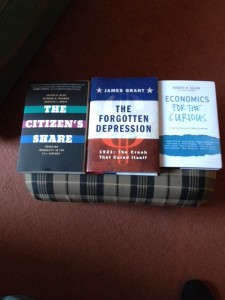I very much enjoyed Rebecca Solnit’s book of essays, [amazon_link id=”1595341986″ target=”_blank” ]The Encyclopedia of Trouble and Spaciousness[/amazon_link].
[amazon_image id=”1595341986″ link=”true” target=”_blank” size=”medium” ]The Encyclopedia of Trouble and Spaciousness[/amazon_image]
Among the many interesting perspectives is her take on the aftermath of disasters, and critique of some standard stories of post-disaster disorder – reports or looting and violence. Solnit’s argument is that ‘looting’ is often – usually? – a grotesque misinterpretation of people trying to cope with chaos – with no electricity, no functioning payments system, no logistics – and taking reasonable steps to get food and water. As for violence, she argues that most people become unusually solicitous of the needs of others in the wake of a natural disaster, and that violence often is perpetrated by authorities fearful of losing control – “elite panic”. She describes the way this happened in Haiti, and in New Orleans post-Katrina, when the authorities and white vigilantes shot at black men on the streets, many of whom turned out to be trying to do what the authorities should have been doing, helping the stranded and vulnerable. Anybody who read Dave Egger’s book [amazon_link id=”0141046813″ target=”_blank” ]Zeitoun[/amazon_link] will find that strikes a chord. Without doubt crimes are committed, she accepts, but “far more people did heroic things.”
[amazon_image id=”8804600128″ link=”true” target=”_blank” size=”medium” ]Zeitoun[/amazon_image]
She concludes: “A disaster unfolds a little like a revolution. No one is in charge and anything is possible. The efforts of elites, often portrayed as rescue or protection, are often geared more towards preserving the status quo.” Emergencies are always truth emergencies. This struck a real chord with me because of a report I co-authored with Patrick Meier some years ago for the UN Foundation and Vodafone Foundation about the role of information in disasters – more vital than you can imagine unless you have been caught up in one. (Just think about how helpless or angry or frustrated you feel when your train halts for 5 minutes and there is no announcement – and then magnify that feeling in intensity a thousand-fold.)
The book also has two terrific essays on what Silicon Valley money and incomers are doing to San Francisco (not good) – fabulous observation of the ‘Google bus’ invasion. She writes also about climate change and ecology, the far North, growing food, Detroit, and much else. It has been an ideal companion for me for a couple of hectic weeks. Solnit will be in Bristol for the Festival of Ideas Cities Festival next November.

